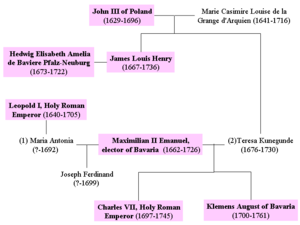Maximilian II Emanuel, Elector of Bavaria
|
|
Maximilian II Emanuel (July 11, 1662 - February 26, 1726) was a Wittelsbach ruler of Bavaria and an elector (Kurfürst) of the Holy Roman Empire. An able soldier, his ambition led to conflicts that limited his ultimate dynastic achievements.
Born in Munich, the son of Ferdinand Maria, Elector of Bavaria, he inherited the elector's mantle while still a minor in 1679. By 1683 he was already embarked on a military career, supporting the Habsburgs in their campaign against the Turks at Vienna. Returning to court for long enough to marry Maria Antonia, daughter of Leopold I, Holy Roman Emperor, on 15 July 1685, his fame was assured when, in 1688, he led the capture of Belgrade from the Turks. In the War of the Grand Alliance he once again fought on the Habsburgs' side, and was appointed governor of the Spanish Netherlands in 1692.
His Netherlands adventure catalysed Max. Emanuel's dynastic ambitions. In the year of his appointment as governor, Maria Antonia died and placed him in the line of Habsburg succession, and his son, Joseph Ferdinand, as heir to most of the Spanish Netherlands. However, his son's death in 1699 prevented a straightforward inheritance and, though he continued to exercise some hope of an eventual settlement, he ultimately conceded. An alternative avenue for his ambition was offered by his 12 January 1694, marriage to Teresa Kunegunda Sobieska, the death of whose father, King of Poland Jan III Sobieski in 1694, offered a claim to the Polish throne.
However, he decided not to pursue even this claim, resolving to concentrate his interests in western Europe and making his sons by Teresa Kunegunda Sobieska, Charles VII Albert and Klemens August, the principle outlets for his ambitions. By the outbreak of the War of the Spanish Succession in 1701, he had developed a plan for the Wittelsbachs to supplant the Habsburgs as Holy Roman Emperors. Allying himself with the French against the Habsburgs, his plans were frustrated by the disastrous defeat at the Battle of Blenheim in 1704. In the ensuing evacuation of his court to the Netherlands, Max. Emanuel's family became separated and his sons were held prisoners for several years in Austria, Klemens August being brought up by Jesuits. Bavaria was partitioned between Austria and the elector palatine, leading to bloody uprisings of the people against the Austrian imperial troops. Max. Emanuel was again forced to flee the Netherlands after the Battle of Ramillies and found refuge at the French court in Brussels.
The war was finally ended in 1713 in the Treaty of Utrecht which restored Max. Emanuel. Only in 1715 was the family re-united in Munich.
After his death in Munich, his son Charles VII Albert finally realised Wittelsbach aspirations, being elected Holy Roman Emperor in 1742.
| Preceded by: Ferdinand Maria | Elector of Bavaria 1679-1726 | Succeeded by: Charles VII |
| Preceded by: The Marquis of Castagna | Governor of the Spanish Netherlands 1692-1706 | Succeeded by: British and Dutch military occupation Template:End boxde:Maximilian II. Emanuel nl:Maximiliaan II Emanuel van Beieren |

